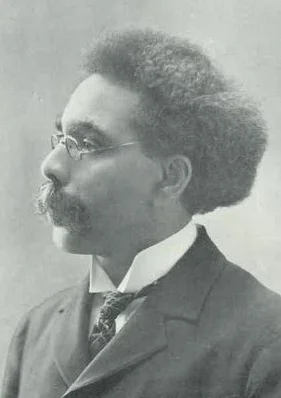Order of New Brunswick for first Canadian-born Black lawyer
August 26, 2019
Nearly two years ago, New Brunswick Black History Society (NBBHS) Project Co-ordinator and Canadian Boxing Hall of Fame inductee Ralph ‘Tiger’ Thomas asked amateur historian and researcher Peter Little to try to make a connection between Abraham Beverley Walker and a woman bearing the same surname.
Though he couldn’t make the link, Little wanted to know who Abraham Walker was as he had never heard the name.
Finding out blew him away.
Born in 1851, Walker was the first Canadian-born Black lawyer, the University of New Brunswick’s first Black Law student and the first Black New Brunswicker to publish a magazine.
“Once I started to research his life, I was hooked,” said Little who successfully applied to have the trailblazer – who died 110 years ago -- honoured posthumously with the Order of New Brunswick this fall. “It’s surprising that very few people know of this man and his accomplishments as he’s someone with many firsts. At the same time, Black History wasn’t mentioned when I was in school.”
The product of a Loyalist farming family who was among the first Blacks to settle on the Kingston peninsula in 1786 after the American Revolutionary War, Walker learned shorthand in school and, while in his teens, worked as a secretary and stenographer with phrenologists Orson Fowler and Samuel Wells who toured Canada as part of their lecture series.
After graduating from the National University in Washington D.C, he returned to Saint John and started a three-year internship with George Gilbert while working as a shorthand reporter. Walker earned his Law degree from National University and was admitted as a solicitor to the Supreme Court of New Brunswick in June 1881. He made history a year later by being called to the Bar.
Opening a law office in Saint John where the Black population was miniscule, he was forced to close it after the practice wasn’t flourishing. Frustrated at being unsuccessful in his bid to become the official court stenographer and excluded from a private banquet arranged by a senior member of the Saint John Law Society in 1885 to mark the New Brunswick Bar centenary, Walker moved to Atlanta in 1889.
Back in New Brunswick two years later, he became the first student to matriculate at Saint John Law School and, in 1893, was appointed the Saint John Law Society librarian, a position he held for six years.
Denied the opportunity to become a Queen’s and King’s Counsel because of racism, Walker launched ‘Neith’, which was a monthly magazine covering several topics, including Literature, Science, Art, Philosophy and Economics. When the publication went under a year later because of financial constraints, he founded and promoted the African Civilization Movement aimed at recruiting educated and industrious Blacks in Canada and other developed nations to establish a model colony for Blacks in Africa.
It was while in Ontario promoting the Movement that he contracted pulmonary tuberculosis that led to his death in 1909.
A prolific writer, Walker authored ‘The Trials, Hardships and Destiny of the Negro Race: An Appeal to the Tribunal of Humanity for Fair Play & Justice’, that was published as a six-part series in the Saint John Globe Saturday supplement in 1897.
Little has written a book, ‘Abraham Beverley Walker: Lawyer. Lecturer and Activist’, that is expected to be released later this year.
“The thing I found most fascinating about Abraham during my research was his mastery of the English Language,” the retired Irving Oil Refinery senior production planner pointed out. “While reading that six-part series, I was struck by how similar his rhetoric was to Dr. Martin Luther King Jr. At different times while I was writing the book, I went to YouTube and brought up some of King’s speeches that I played in the background. Walker also made a sort of ‘I Have a Dream Speech’ and my book ends with a segment from that speech.”
Peter Little
Little has had some success trying to track down Walker’s descendants. He had five children, four of whom succumbed at an early age to tuberculosis.
“Just one son (George) survived and I found his descendants using the genealogy website,” he noted. “Some were in Arkansas when they died and a couple of Walker’s grandchildren lived to almost 100 before passing away about three years ago. I sent an email to them via Ancestry, but the person that put the family tree up allowed the membership to lapse because I didn’t get a response. I tried searching the Arkansas obits for these folks by name, but that is like looking for a needle in a haystack.”
On October 30, Little will accept the posthumous award that will be held in trust by the NBBHS.
“My whole purpose of doing this is to ‘right a wrong’, and raise Abraham’s profile from a man whose legacy fell through the cracks in the floor of history to where it should be among our nation’s greatest leaders,” he said.
The NBBHS is honoured to hold the award.
Ralph ‘Tiger’ Thomas
“When we learnt of Abraham’s achievements, we did some digging and found out that he was very accomplished,” said Thomas who is a former amateur and professional boxer with an honourary degree from the University of New Brunswick. “In fact, we had him on one of our calendars.”
Little has approached the Mayor and Deputy about securing a marker for Walker’s grave and getting a school or street bearing his name.
“I talked to them a few months ago and, of course, they didn’t know anything about Walker,” he said. “They said no new streets are under construction. There are about three King Sts. in Saint John and I don’t see why one of their names can’t be changed. I don’t take no for an answer very easily.”
Walker is the third Black Canadian to be honoured with the Order of New Brunswick which was established 19 years ago.
The others are Willie O’Ree who broke hockey’s colour bar in 1958 with the Boston Bruins and was inducted into the Hockey Hall of Fame in the Builder’s category last year and opera singer and 2008 Juno Award winner Measha Brueggergosman who completed her undergraduate studies in Music at the University of Toronto and spent five years in Germany where she earned a Master of Music.
There have been a total of 165 inductees since 2002.








